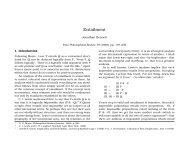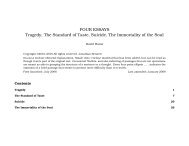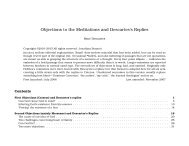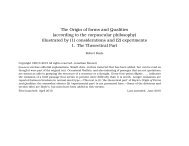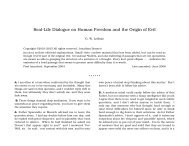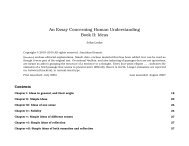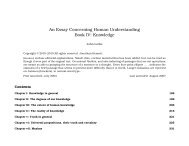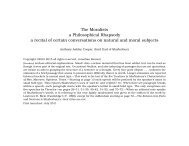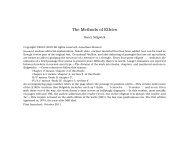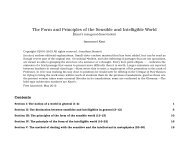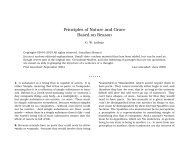A Vindication of the Rights of Woman with - Early Modern Texts
A Vindication of the Rights of Woman with - Early Modern Texts
A Vindication of the Rights of Woman with - Early Modern Texts
Create successful ePaper yourself
Turn your PDF publications into a flip-book with our unique Google optimized e-Paper software.
The <strong>Rights</strong> <strong>of</strong> <strong>Woman</strong> Mary Wollstonecraft 5: Pity bordering on contempt<br />
<strong>of</strong> faults—she ought to learn even to suffer injustice and to<br />
bear her husband’s insults <strong>with</strong>out complaint. This is for<br />
her sake, not his: if she becomes stubborn and hostile this<br />
will make her husband worse. . . .<br />
·WOLLSTONECRAFT·<br />
. . . .The being who patiently endures injustice and silently<br />
puts up <strong>with</strong> insults will soon become unjust, i.e. unable<br />
to tell right from wrong. Anyway, <strong>the</strong> factual premise is<br />
wrong: this is not <strong>the</strong> true way to form or improve <strong>the</strong><br />
temperament; for in general men have better temperaments<br />
than women because <strong>the</strong>y are occupied in pursuits that<br />
interest <strong>the</strong> head as well as <strong>the</strong> heart, and <strong>the</strong> head’s<br />
steadiness gives a healthy temperature [MW’s word] to <strong>the</strong><br />
heart. People <strong>of</strong> sensibility seldom have good temperaments.<br />
The formation <strong>of</strong> <strong>the</strong> temperament is <strong>the</strong> cool work <strong>of</strong> reason,<br />
which brings helpful skill to bear on bringing toge<strong>the</strong>r jarring<br />
elements. I never knew a weak or ignorant person who<br />
had a good temperament, though <strong>the</strong> constitutional good<br />
humour and <strong>the</strong> docility that fear causes in <strong>the</strong> behaviour<br />
if <strong>of</strong>ten called ‘good temperament’. Note: ‘causes in <strong>the</strong><br />
behaviour’—because genuine meekness reaches <strong>the</strong> heart<br />
or mind only as an effect <strong>of</strong> reflection. The simple restraint<br />
·arising from fear· produces a number <strong>of</strong> unpleasant moods<br />
in domestic life, as many sensible men would agree after<br />
finding some <strong>of</strong> <strong>the</strong>se gentle irritable creatures to be very<br />
troublesome companions. Rousseau goes on to argue:<br />
·ROUSSEAU·<br />
Each sex should preserve its own special tone and manner: a<br />
meek husband may make a wife behave badly, but mildness<br />
<strong>of</strong> disposition on her part will always bring him back to<br />
reason—at least if he isn’t absolutely a brute—and will<br />
sooner or later triumph over him.<br />
57<br />
·WOLLSTONECRAFT·<br />
Perhaps <strong>the</strong> mildness <strong>of</strong> reason might sometimes have this<br />
effect; but abject fear always inspires contempt, and tears<br />
are eloquent only when <strong>the</strong>y flow down fair cheeks.<br />
A heart that can melt when insulted, and instead <strong>of</strong><br />
revolting at injustice can kiss <strong>the</strong> rod—what materials can<br />
it be made <strong>of</strong>? If a woman can caress a man <strong>with</strong> true<br />
feminine s<strong>of</strong>tness at <strong>the</strong> very moment when he treats her<br />
tyrannically, isn’t it fair to infer that her virtue is built on<br />
narrow views and selfishness? Nature has never dictated<br />
any such insincerity. You may call prudence <strong>of</strong> this sort a<br />
virtue; but morality becomes vague when any part <strong>of</strong> it is<br />
supposed to rest on falsehood. These are mere expedients,<br />
and expedients are only useful for <strong>the</strong> moment ·whereas <strong>the</strong><br />
good in virtues is everlasting·.<br />
Let <strong>the</strong> husband beware <strong>of</strong> trusting too completely in this<br />
servile obedience; for if his wife can sweetly •caress him when<br />
she is and ought to be angry. . . .she may •do <strong>the</strong> same after<br />
parting <strong>with</strong> a lover. These are all preparations for adultery!<br />
If fear <strong>of</strong> <strong>the</strong> world or <strong>of</strong> hell restrains her desire to please<br />
o<strong>the</strong>r men when she can no longer please her husband, what<br />
alternative is <strong>the</strong>re for this being who was formed by nature<br />
and art only to please man? What can compensate her for<br />
this privation? Where is she to look for a fresh employment?<br />
Where can she find sufficient strength <strong>of</strong> mind to decide to<br />
begin <strong>the</strong> search, when her habits are fixed and her chaotic<br />
mind has long been ruled by vanity?<br />
But this biased moralist ·Rouseau· makes a plausible<br />
case, based on his own system, in favour <strong>of</strong> cunning.<br />
·ROUSSEAU·<br />
Daughters should always be submissive, but <strong>the</strong>ir mo<strong>the</strong>rs<br />
should not be inflexible. To make a young person tractable,<br />
she shouldn’t be made unhappy; to make her modest, she<br />
shouldn’t be made stupid. On <strong>the</strong> contrary, I wouldn’t be



